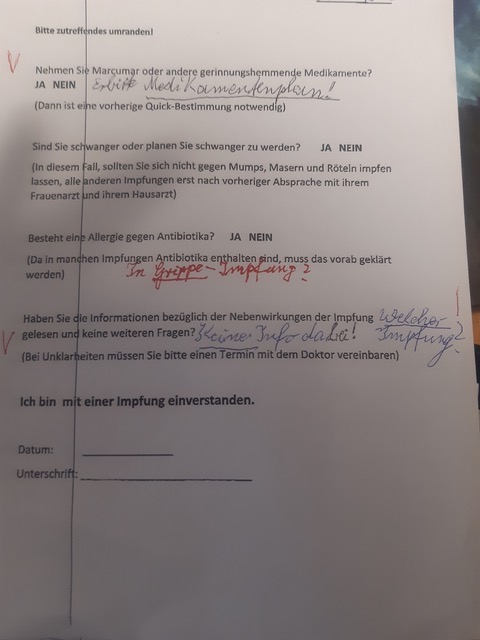Since shortly after Christmas, it’s been down to business in the homes: mobile teams are vaccinating our most vulnerable. Vaccination consent is being obtained by a large number of homes with threats, scare tactics and false promises, as 2020News has learned. There is often no trace of proper vaccination education. State governments, regulatory agencies and the RKI are part of the problem.
One thing is certain: vaccination is an interference with physical integrity. It can only be carried out without penalty or liability if the vaccinated person has given his or her consent, which is valid under medical law. For this purpose, the known or presumed risks must be pointed out to the vaccinated person, and the benefits must be truthfully presented.
It is also clear that the mRNA vaccine is dangerous, if only because the clinical trial period was so short that it is not even possible to make an approximate estimate of the side effects to be expected. The new method of vaccination with viral RNA – a genetic treatment – has never been used on humans. This is especially true for those who are particularly vulnerable due to old age or multimorbidity, for whom no targeted studies at all have yet been conducted. Preclinical studies on animals have not been carried out to the required extent or the study results are not disclosed. Excessive immune responses upon encounter with the wild virus are known from previous unsuccessful attempts to develop corona vaccines. During the animal experiments at that time, the animals (cats, ferrets and resus monkeys) suffered severe health damage or even died due to their immune systems getting out of control.
It is also certain that even with the vaccine there should not or cannot be a short-term return to Old Normal. This is simply because, contrary to what the manufacturer claims, the effectiveness of the vaccination is by no means 95 percent in the sense of “95 percent of those vaccinated are protected against an active infection, i.e. disease”. This would mean quite plastically that with 21,750 test persons in the placebo group up to frightening 20,663 could be infected/ill two months after the reference date, in the vaccination group however only manageable 1,088.
Two months after vaccination, however, with continued participation of all in social and/or working life, only 154 individuals in the placebo group were found to have corona infections/diseases, compared to 8 in the vaccination group. This is where the BioNTech/Pfizer calculation comes in: Of a total of 162 infected/diseased persons, 8 diseased vaccinees represent 5 percent. Thus, the company arrives – to this extent correctly – at an absolute risk reduction of 95 percent.
However, the 154 people who were additionally not infected after two months of vaccination compared to the placebo group are quite a different house number than an army of 20,663 healthy vaccinees that most people will imagine with the proudly proclaimed 95 percent effectiveness.
The crucial question for assessing the efficacy of vaccination, and thus for seriously estimating its benefit/risk profile for the layperson, is therefore: how many people had to be vaccinated to prevent one additional person – compared to the placebo group – from becoming infected/diseased? In the case of the BioNTech/Pfizer vaccine, this is 146 people. This corresponds to a relative risk reduction of 0.7 percent.
In plain English, a high-risk vaccination of 21,750 people could (possibly) prevent 154 people from becoming infected/ill with a disease that has a lethality on par with influenza. As an aside, the BioNTech/Pfizer study only detected COVID19 or asymptomatic SARS-COV-2 infection by PCR testing with all its problems (false positives, etc.). Therefore, the validity of the study results have to be marked with a question mark also from this point of view.
Back to the homes: With proper education our old people in the homes would have to understand that they buy a 0.7% lower probability of being infected with corona/coming down with it by using a quasi untested vaccine, which already shows clear health risks in the short term, not to mention medium and long term risks. The head of research at the UKE, Prof. Addo, has already reported that with the second vaccination dose, fever occurred in 20 percent of the test subjects and severe chills in 60 percent, which alone is no small problem for a (highly) aged person who may have multiple pre-diseases.
The informed consent required by medical law presupposes, as noted at the outset, a correspondingly comprehensive explanation. It must be freely given and must not be based on false promises, otherwise it is simply null and void.
The reality is different, as reports from nursing home residents, their relatives, nursing home employees and caregivers to 2020News show.
Those affected report that in many homes there is enormous pressure to grant vaccination consent. In some cases, residents are openly threatened or implied that they will have to leave the home if they are not vaccinated. In addition, it is often promised that everything will be as it used to be after the vaccination, that visitors can finally come again, that children and grandchildren can be hugged, etc.
From one home we received the following letter of request to the relatives: “There is a ray of hope on the horizon, because the big vaccination campaign is about to beginn. We would like to take this opportunity to urge you once again to have your residents vaccinated in order to protect them from further harm….. Please get yourself vaccinated too, because if not enough people in the general population are willing to do so, then this condition will continue to plague us and bring restrictions that we all, after all, no longer want. Please keep this in mind when making your decision to vaccinate. By doing so, you will help transform the home into a safe environment for residents and staff alike, so that we can return to normal times where we can once again embrace each other and spend quality time together.”
One staff member of a home wrote: “In the retirement home where I work, the residents were informed during lunch that it would be best for them to get vaccinated. This was done by the home’s management. She reported that half had already signed and she would “get around” the rest… The staff was also asked if they would get vaccinated, if the answer was no, they were told, then the home and the staff member would have to split up.”
A podiatrist writes: “As my patients told me, they were all vaccinated there. I asked if they wanted it and was told they had to…”
A relative reports, “My father was blindsided with his own testing and signing for a vaccination for my mother without necessary education.” After his objection, the bomb had now burst, the home insisted on a consent, which had to be signed by father and son together. The father was completely overwhelmed, afraid “that my mother would have to go home, etc. (blackmail).” The son is now working on a compromise consent linking the consent to a the doctor’s confirmation that it is safe to vaccinate his mother.
2020News publishes here a draft of the Ministry of Health of North Rhine-Westphalia as of December 14, 2020, which is presumably the basis of the approach of many homes in this or a similar form. According to this plan, the home administrators are requested to collect the vaccination consents three days before the vaccination, which are then checked by the vaccination team. This team answers additional questions, if necessary. Involvement of the home’s supervising physician is suggested in the plan, but in many cases does not occur, as 2020News has learned. In many cases, residents, their relatives or caregivers sign the RKI/Green Cross educational form almost blindly, which in the version until December 22 contained virtually no information about the expected vaccination risks. Since December 22, a revised version has been offered, but it is still questionable in terms of medical law.
The journalist Erik R. fish requested in the context of an attorney-accompanied press inquiry information of 10,000 homes for the elderly, how in their house the inoculation clearing-up takes place and on the question catalog the statement of the Betreuergerichtstag registered association, a professional association, which wants to improve the situation of cared for persons, pointed out. With risk-conscious answering of the questions particularly regarding the missing long-term studies it would have been difficult to advise without reservations to the inoculation, as the answer in the press inquiry shows.
In the meantime, the statement of the Betreuergerichtstag e.V., an association of legal guardians, has also been revised. The list of questions has disappeared. The organization has now included the important statement “Vaccinations against the will of a patient may not be carried out, even if a guardian has consented (see § 1906a BGB)” in its letter.
With regard to vaccinations, it states: “If the guardian as representative consents to an officially recommended vaccination with an approved vaccine, the person under guardianship is generally not exposed to any dangers as such by the vaccination within the meaning of Section 1904 (1) of the German Civil Code, so that his or her consent does not have to be approved by the guardianship court. Exceptions are conceivable if, for example, a vaccination would be dangerous in the specific case of this cared-for person because of his or her current state of health. This may have to be assessed by a medical practitioner.”
The inconspicuous “as a rule” is important here. In view of the known problem areas of excessive immune reaction when encountering the wild virus, possible infertility and the problem of allergic reactions to the nanoparticles added for stabilization, which are still not addressed in the RKI information sheet, a hazardous situation cannot be ruled out even irrespective of the concrete state of health of the person being cared for.
The Corona Committee will point out to the Betreuergerichtstag e.V. the vaccination risks that exist according to the unanimous opinion of a large number of scientists, including Dr. Wodarg, Dr. Yedaon, Prof. Hockertz and Prof. Bhakdi.




